“…to those who think it is fictionally exaggerated I only say try it first and see. Because it can never be as bad in fiction as it is in real life.”
– Ken Kesey
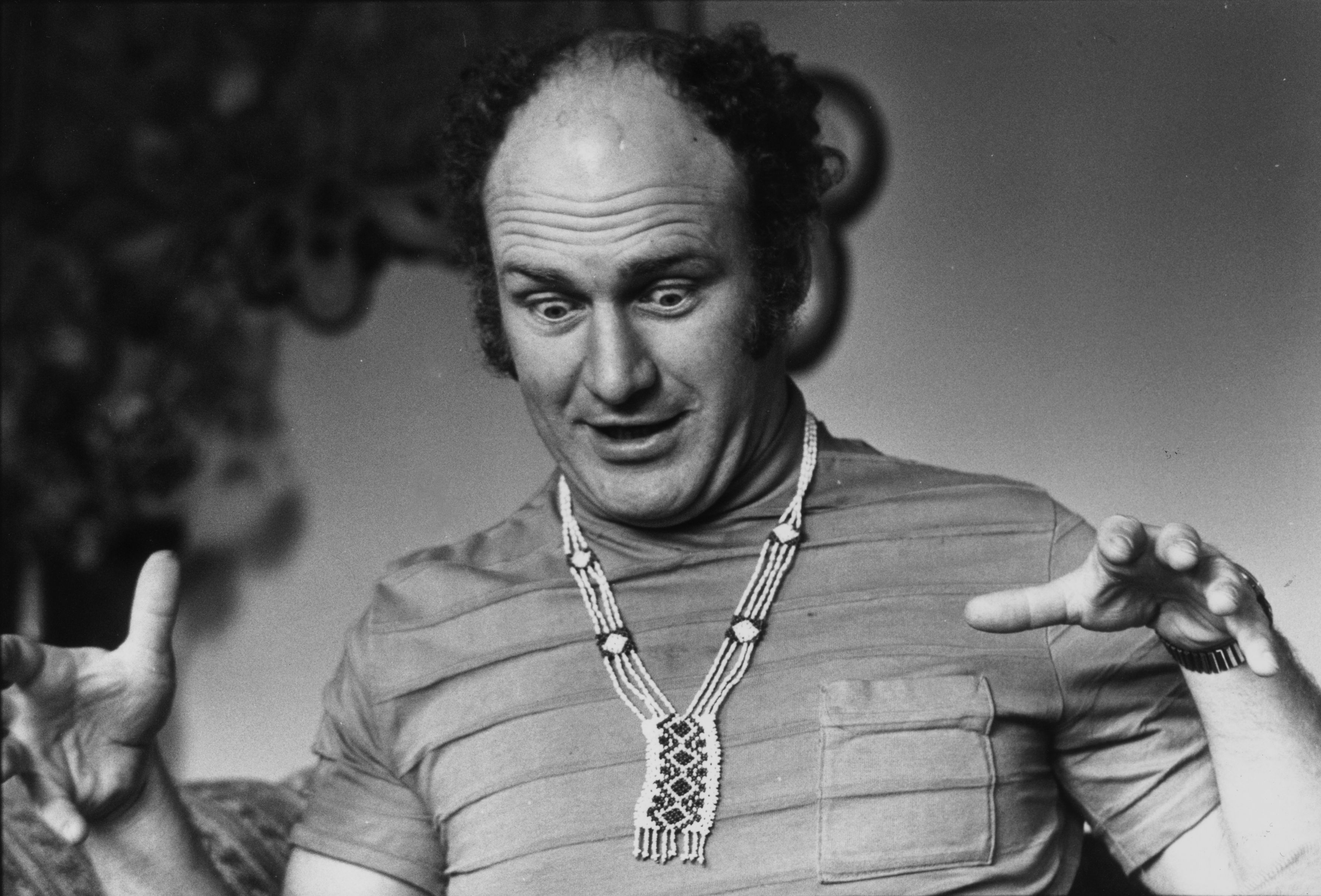
Ken Kesey (September 17, 1935 – November 10, 2001) had heard enough. On January 7th of 1964, he confronted his critics by way of a letter to the New York Times. The critics who’d picked away at Dale Wasserman’s Broadway adaptation of Kesey’s novel One Flew Over The Cuckoo’s Nest, starring Kirk Douglas as Randle Patrick McMurphy, would know they were wrong.
Douglas (December 9, 1916 – February 5, 2020) worked to get the play produced as a film but was unable to find a studio willing to make it with him. Eventually, he gave the rights to his son Michael, who succeeded in getting the film produced. In 1975, Kirk’s son Michael Douglas produced the movie, starring Jack Nicholson. It won Oscars for Best Picture, Director, Screenplay, Leading Actor and Leading Actress.
In 2001, Douglas harked back to one that got away:
One big disappointment in my life was One Flew Over the Cuckoo’s Nest. I bought the rights to the book, but no one wanted to make it into a movie. So I paid to have it made into a Broadway play. There was one line in there that was so beautiful. McMurphy is trying to help all these people on the ward. There was a sink, and he tried to lift it out of the wall, but he couldn’t. He tried really hard, but it wouldn’t budge. As he was leaving the room, with all the guys watching, he turned around and said, “But I tried, goddammit, I tried!” Sometimes I think I should have that as my epitaph.
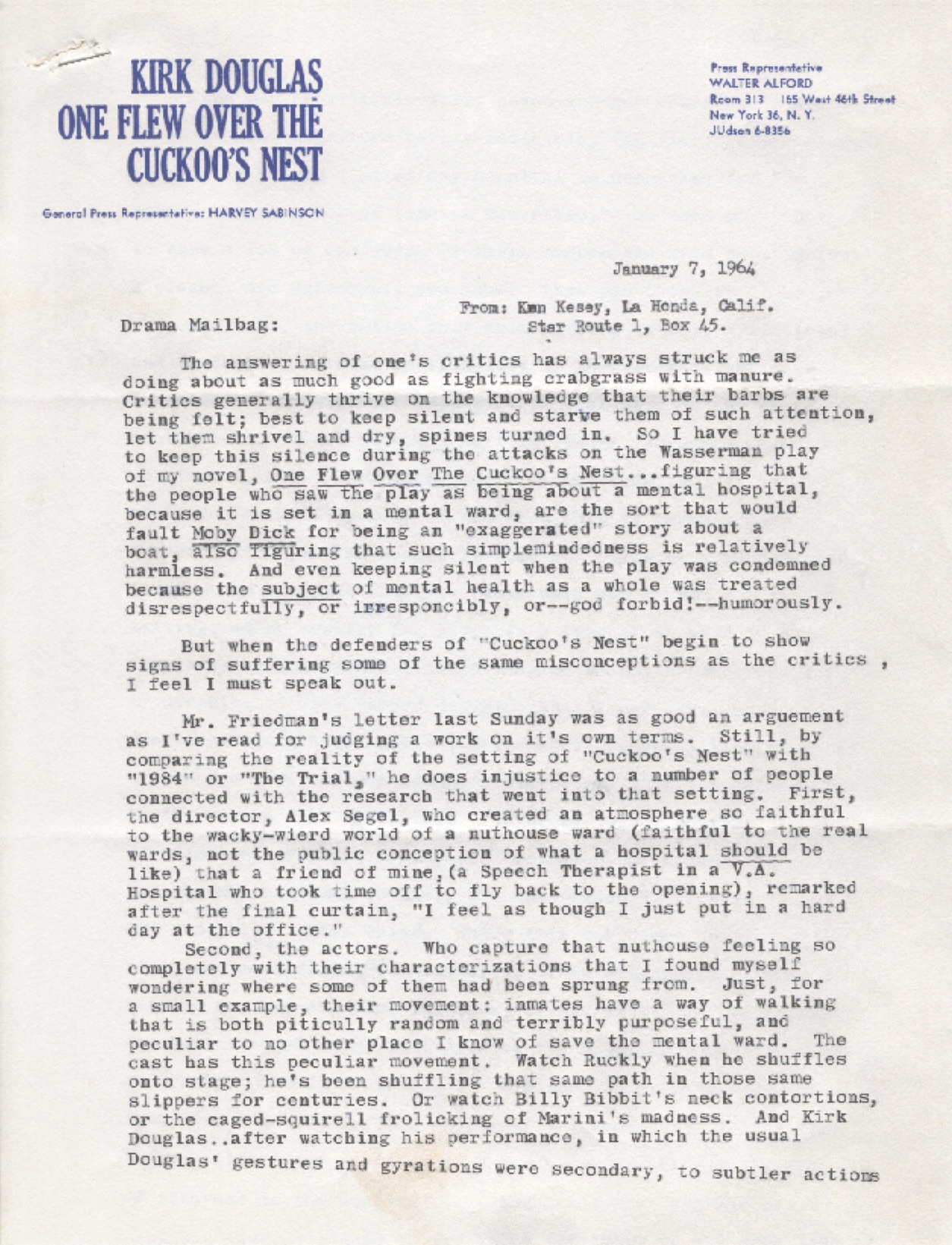
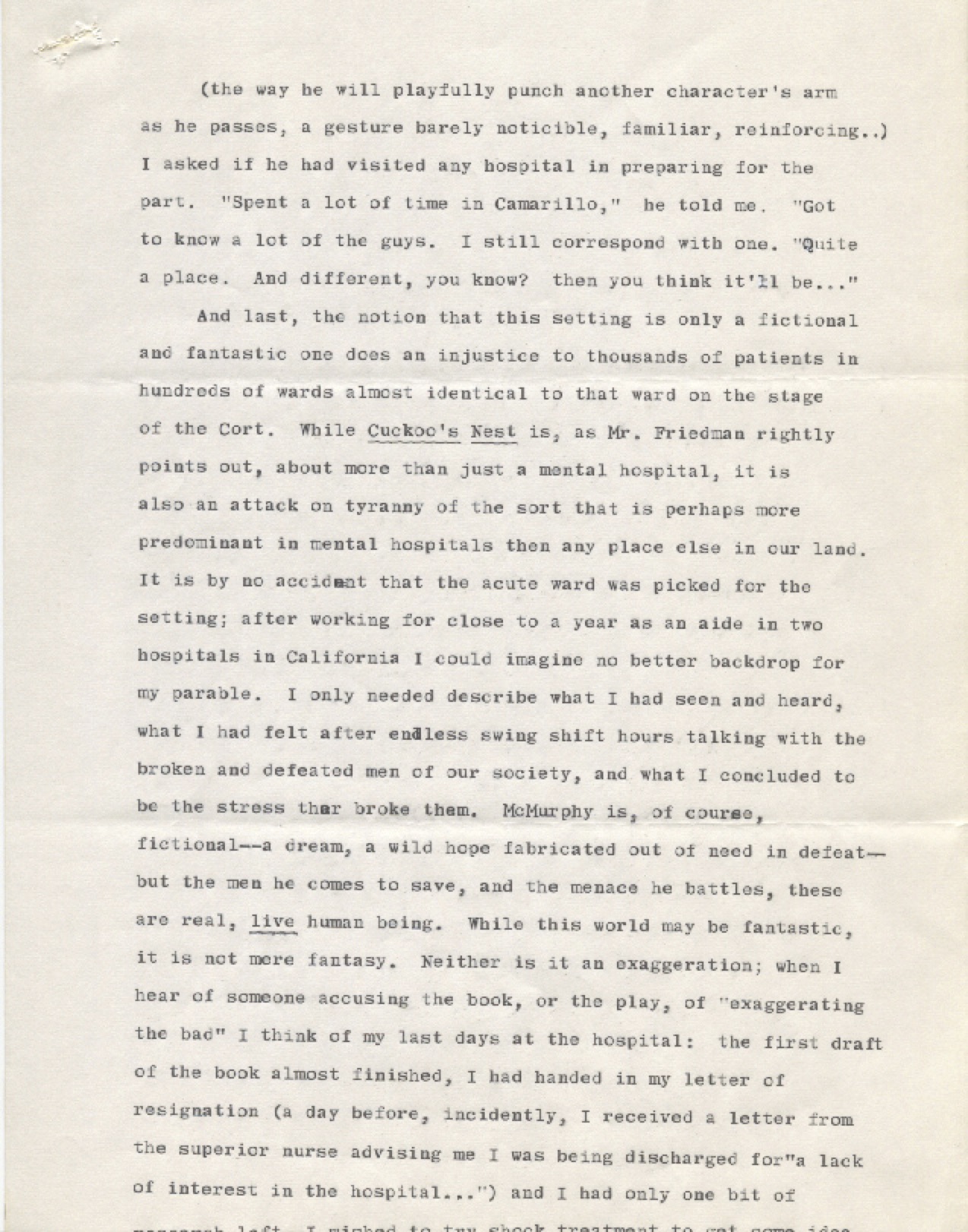
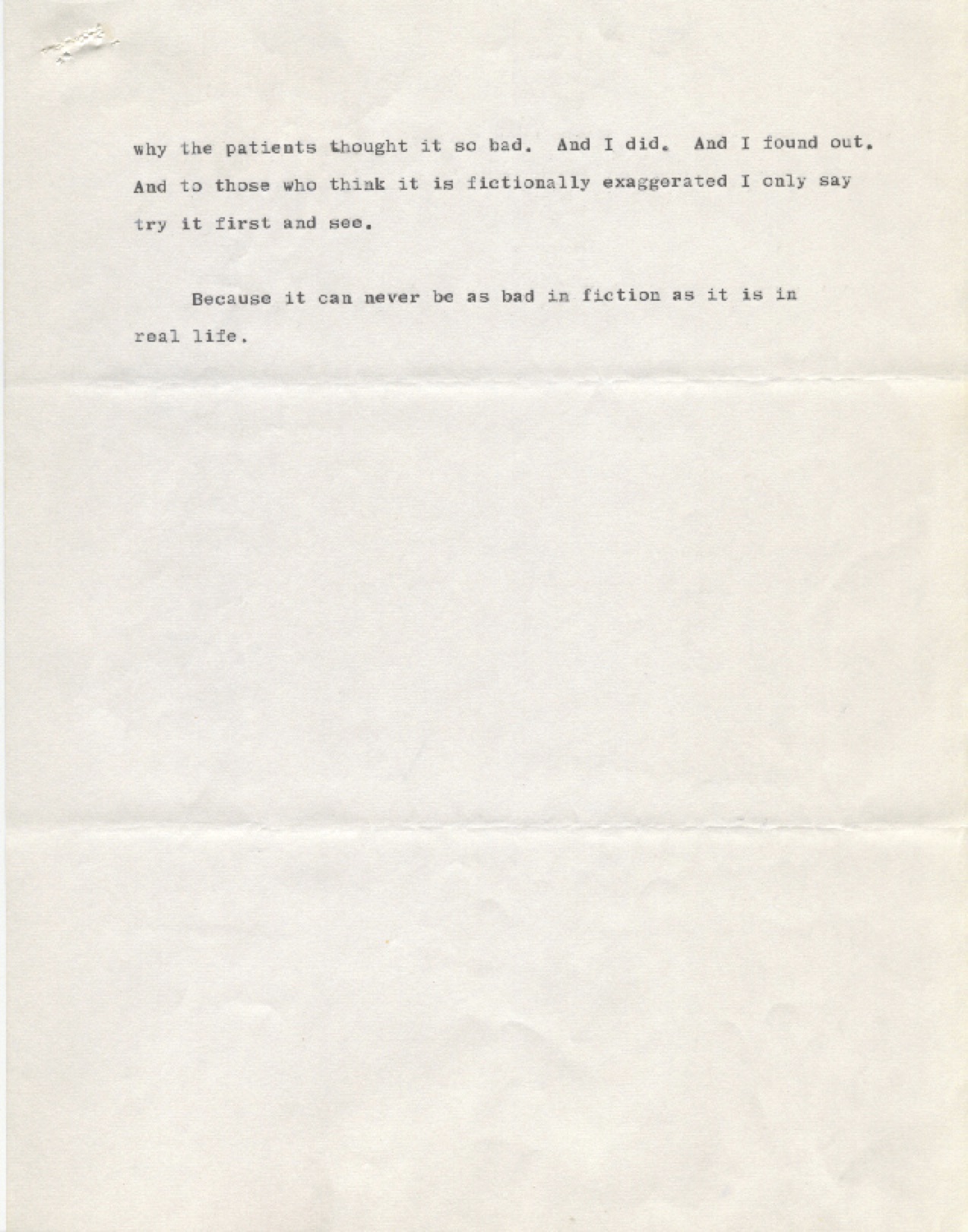
Transcript
KIRK DOUGLAS
ONE FLEW OVER THE
CUCKOO’S NESTJanuary 7, 1964
From: Ken Kesey, [Redacted]
Drama Mailbag:
The answering of one’s critics has always struck me as doing about as much good as fighting crabgrass with manure. Critics generally thrive on the knowledge that their barbs are being felt; best to keep silent and starve them of such attention, let them shrivel and dry, spines turned in. So I have tried to keep this silence during the attacks on the Wasserman play of my novel, One Flew Over The Cuckoo’s Nest…figuring that the people who saw the play as being about a mental hospital, because it is set in a mental ward, are the sort that would fault Moby Dick for being an “exaggerated” story about a boat, also figuring that such simplemindedness is relatively harmless. And even keeping silent when the play was condemned because the subject of mental health as a whole was treated disrespectfully, or irresponsibly, or–god forbid!–humorously.
But when the defenders of “Cuckoo’s Nest” begin to show signs of suffering some of the same misconceptions as the critics, I feel I must speak out.
Mr. Friedman’s letter last Sunday was as good an argument as I’ve read for judging a work on it’s own terms. Still, by comparing the reality of the setting of “Cuckoo’s Nest” with “1984” or “The Trial,” he does injustice to a number of people connected with the research that went into that setting. First, the director, Alex Segel, who created an atmosphere so faithful to the wacky-weird world of a nuthouse ward (faithful to the real wards, not the public conception of what a hospital should be like) that a friend of mine, (a Speech Therapist in a V.A. Hospital who took time off to fly back to the opening), remarked after the final curtain, “I feel as though I just put in a hard day at the office.”
Second, the actors. Who capture that nuthouse feeling so completely with their characterizations that I found myself wondering where some of them had been sprung from. Just, for a small example, their movement: inmates have a way of walking that is both piticully random and terribly purposeful, and peculiar to no other place I know of save the mental ward. The cast has this peculiar movement. Watch Ruckly when he shuffles onto stage; he’s been shuffling that same path in those same slippers for centuries. Or watch Billy Bibbit’s neck contortions, or the caged-squirell frolicking of Marini’s madness. And Kirk Douglas..after watching his performance, in which the usual Douglas’ gestures and gyrations were secondary, to subtler actions (the way he will playfully punch another character’s arm as he passes, a gesture barely noticible, familiar, reinforcing..) I asked if he had visited any hospital in preparing for the part. “Spent a lot of time in Camarillo,” he told me. “Got to know a lot of the guys. I still correspond with one. “Quite a place. And different, you know? then you think it’ll be…”
And last, the notion that this setting is only a fictional and fantastic one does an injustice to thousands of patients in hundreds of wards almost identical to that ward on the stage of the Cort. While Cuckoo’s Nest is, as Mr. Friedman rightly points out, about more than just a mental hospital, it is also an attack on tyranny of the sort that is perhaps more predominant in mental hospitals then any place else in our land. It is by no accident that the acute ward was picked for the setting; after working for close to a year as an aide in two hospitals in California I could imagine no better backdrop for my parable. I only needed describe what I had seen and heard, what I had felt after endless swing shift hours talking with the broken and defeated men of our society, and what I concluded to be the stress thar broke them. McMurphy is, of course, fictional–a dream, a wild hope fabricated out of need in defeat–but the men he comes to save, and the menace he battles, these are real, live human being. While this world may be fantastic, it is not mere fantasy. Neither is it an exaggeration; when I hear of someone accusing the book, or the play, of “exaggerating the bad” I think of my last days at the hospital: the first draft of the book almost finished, I had handed in my letter of resignation (a day before, incidently, I received a letter from the superior nurse advising me I was being discharged for “a lack of interest in the hospital…”) and I had only one bit of research left: I wished to try shock treatment to get some idea why the patients thought it so bad. And I did. And I found out. And to those who think it is fictionally exaggerated I only say try it first and see.
Because it can never be as bad in fiction as it is in real life.
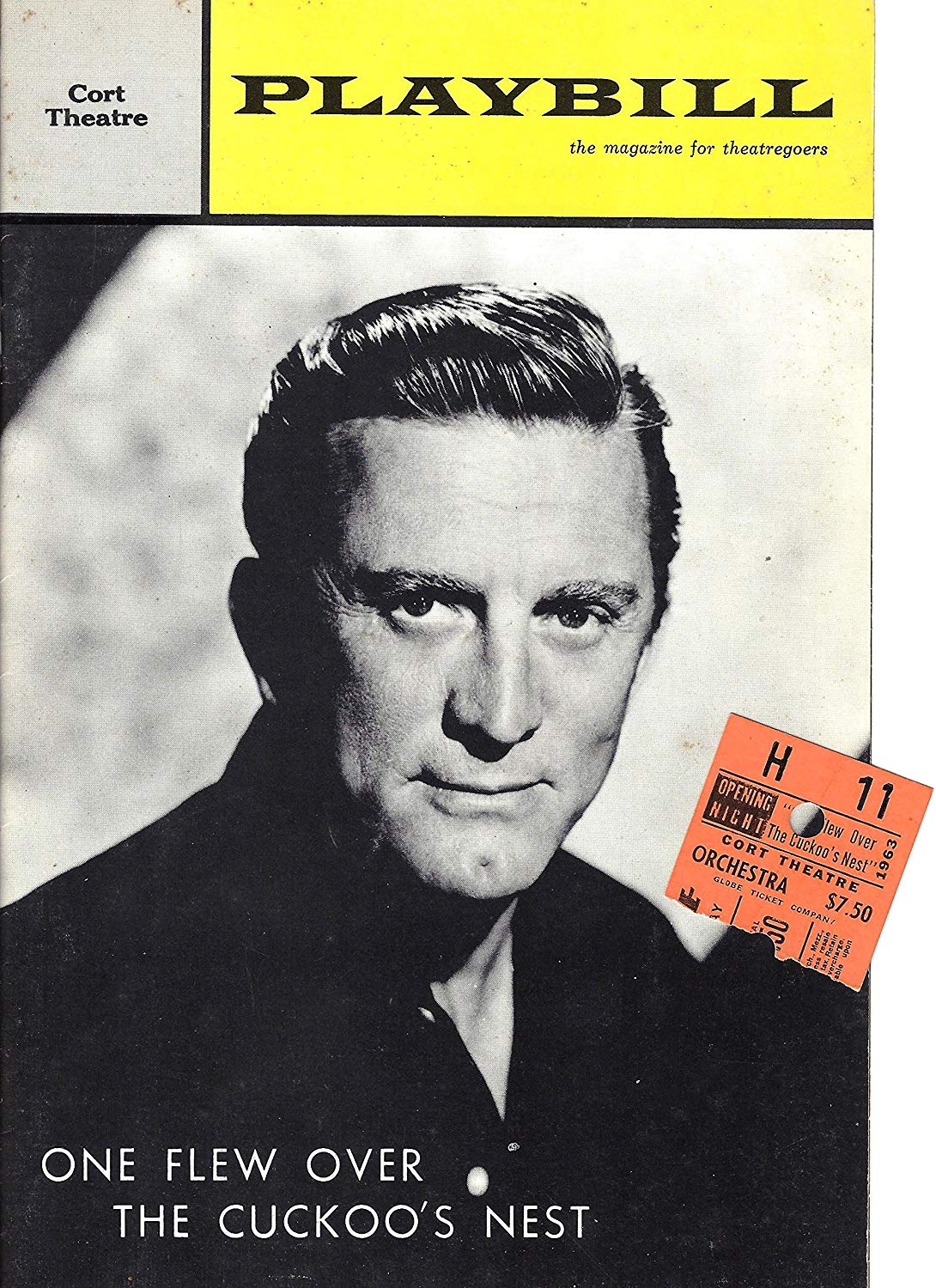
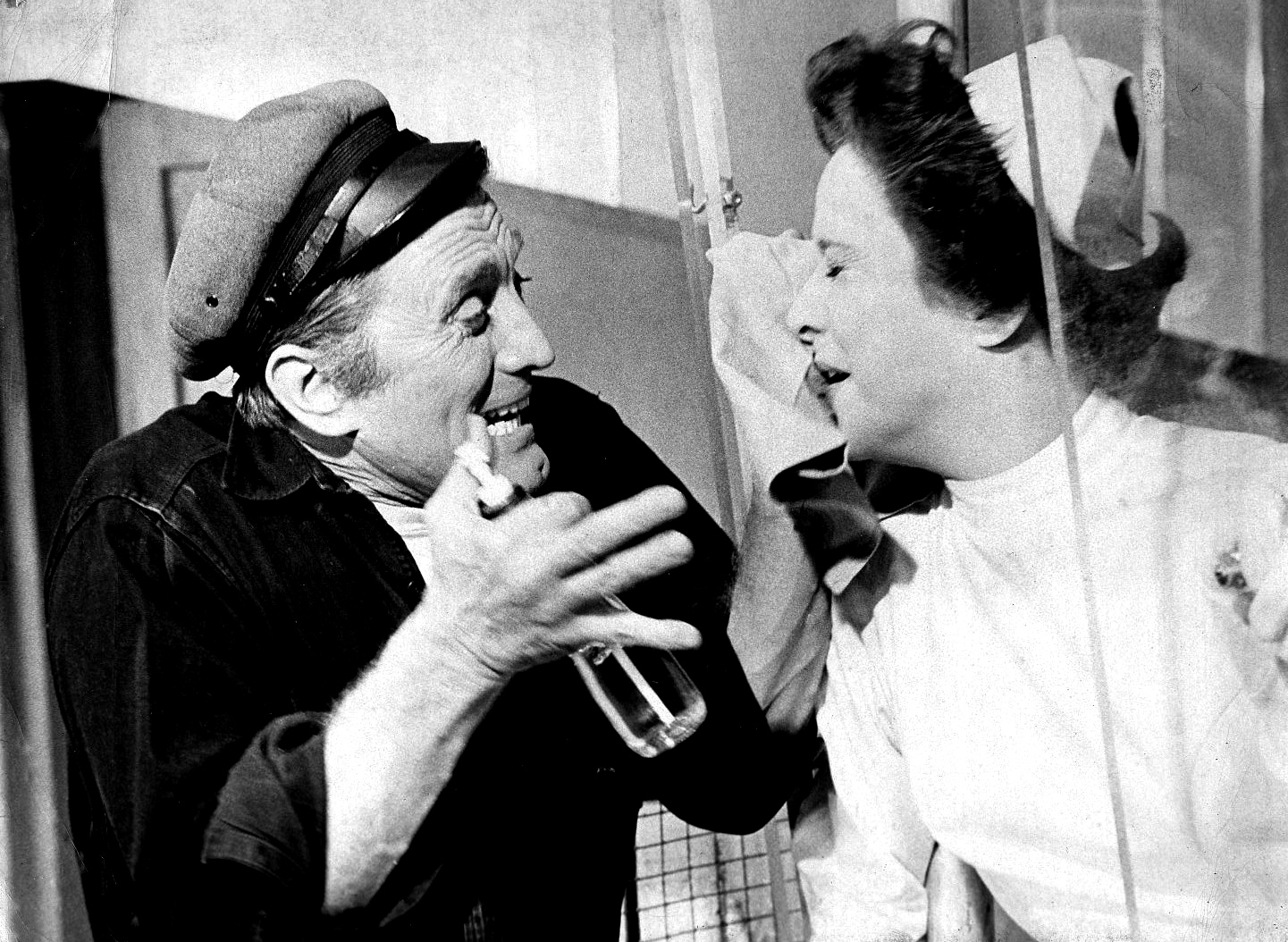
Kirk Douglas and Joan Tetzel starring in the 1963 Broadway production
Lead image: 10th May 1969: Ken Kesey (1935 – 2001), American author of ‘One Flew Over The Cuckoo’s Nest’ and ‘Sometime’s A Great Notion’ – Photo by Roy Jones
Via: Letters of Note,
Would you like to support Flashbak?
Please consider making a donation to our site. We don't want to rely on ads to bring you the best of visual culture. You can also support us by signing up to our Mailing List. And you can also follow us on Facebook, Instagram and Twitter. For great art and culture delivered to your door, visit our shop.

